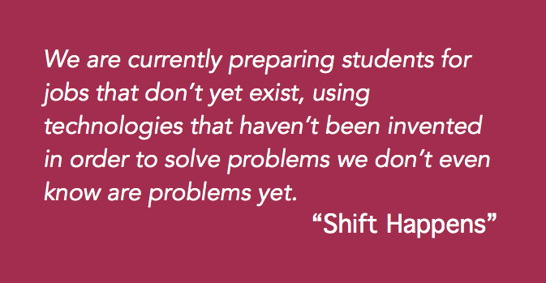
Our students will inherit a very different world than the one we know today, a point well illustrated in this viral video “Shift Happens.” They will need to be able to navigate as adults in the 21st century. This broader sweep is punctuated with some jarring predictions and extrapolations: For instance, the learners in our schools right now will have anywhere from 10-14 job changes by the time they are 38. The complex issues before us today require a key set of problem-solving skills. How does Tabor Academy ensure our young men and women develop the curiosity and resilience to pursue and practice the skills of critical thinking, collaboration, communication, metacognition, empathy and citizenship for transfer to novel scenarios, as well as have the applicable content knowledge they need for the world they will engage?
It starts with our faculty – in the classroom, in afternoon co-curricular activities, in residential life, and in advisory - faculty who embrace and employ these same skills in each area of school life. After all, we can’t share with our students – much less expect of students – what we don’t own ourselves. To meet the growth mindset of students, we ourselves need to engage in and continuously revisit the difficult work of unlearning, learning and relearning how and what to learn. From the world of management, thought leader Peter Drucker offered, “We now accept the fact that learning is a lifelong process of keeping abreast of change. And the most pressing task is to teach people how to learn.”
To this end, nearly seventy-five percent (and growing!) of Tabor’s faculty has been engaged in some form of professional growth this year. In addition to the team-based Baseline Process (in which an individual faculty member builds a team of four colleagues who offer feedback on all areas of the individual’s service to Tabor), many of our faculty are participating in professional growth workshops and seminars designed to reframe how we might think about the learning opportunities we create for the education our students need (as opposed to the education their parents needed). Better still, several of our faculty are presenting and leading at these workshops.
Tabor’s Mission Statement tenet “To inspire a lifelong love of learning” guides adults in their work with students. It also guides the adults in their work with each other. Shift is happening and lifelong learning keeps us balanced.








